This article was medically reviewed by Luba Lee, FNP-BC, MS. Luba Lee, FNP-BC is a Board-Certified Family Nurse Practitioner (FNP) and educator in Tennessee with over a decade of clinical experience. Luba has certifications in Pediatric Advanced Life Support (PALS), Emergency Medicine, Advanced Cardiac Life Support (ACLS), Team Building, and Critical Care Nursing. She received her Master of Science in Nursing (MSN) from the University of Tennessee in 2006.
There are 16 references cited in this article, which can be found at the bottom of the page.
wikiHow marks an article as reader-approved once it receives enough positive feedback. This article received 20 testimonials and 98% of readers who voted found it helpful, earning it our reader-approved status.
This article has been viewed 332,174 times.
Studies show that if there are excessive amounts of albumin, or a globular protein produced by your liver, in your urine, it could be an indicator of kidney damage.[1] This can increase your risk for conditions like diabetes, heart disease, or kidney disease. When you have excessive albumin in your blood, it's called microalbuminuria. A microalbumin result of 30-300 mg/dL indicates that your kidneys are not able to filter protein properly. However, experts note that with lifestyle changes and proper medical treatment, you can lower your microalbumin levels.[2]
Steps
Making Lifestyle Changes
-
1Focus your diet on slow-carb, low-protein, and low-sugar foods. Damaged kidneys cannot process proteins normally, so give your kidneys time to rest by reducing your protein intake. You should eat foods that compromise of slow carbohydrates (where your glucose levels don't spike), low amounts of protein, fat, sodium and sugar. Here are some healthy options:
- Slow carbohydrate foods: porridge oats, beans, brown rice, pasta, lentils, carrots, sweet potatoes, and asparagus.[3]
- Low protein food: bread and cereals, pasta, lettuce, celery, sprouts, cucumber, parsley, tofu, fish and lean meats.[4]
- Low fat and low sodium foods: eat nothing fried (use olive oil if need be) and skip the salt. Avoid canned products such as soup, vegetable, and pasta sauces.[5]
-
Low sugar foods: eggs, kidney beans, tofu, walnuts, cottage cheese, olives, spinach, turnips, asparagus, barley,
- Also, avoid binge eating instead eat small frequent meals. These will help your kidney not to overwork and strain itself from filtering all the waste products.
-
2Avoid alcohol. Getting abnormal levels of microalbumin on your test results is indicative of poor kidney function. The affected kidney can no longer filter ethanol from the alcohol efficiently, which increases the risk of prolonged high microalbumin levels. To combat this, cut out the alcohol and replace it with water, teas, and unsweetened juices.[6]
- A glass of red wine once in a while is your best bet if you need to blend in at your next soiree. Anything other than that should be avoided.
Advertisement -
3Quit smoking. A gradual quitting of smoking is advised rather than immediately stopping it. You may have withdrawal symptoms the same as if you were avoiding alcohol if you go cold turkey. However, regardless of the struggle, it is best if you can control yourself in avoiding these two vices.[7]
- Chronic smokers have a greater risk in developing high blood pressure (smoking restricts your blood vessels, forcing your heart to pump harder, which stresses your kidneys). Nicotine from cigarettes can increase your blood pressure to 10mmHg. If you smoke all throughout the day your blood pressure will remain constantly high.
-
4Lower your blood pressure. Having unmanaged high blood pressure can be a factor of why your albumin levels are high. Normal blood pressure ranges from below 120/80 (mmHg) to 130/80. Blood pressure that is equal to or more than 140 (mmhg) is considered to be high. In order to lower your blood pressure you'll want to limit or avoid foods high in fat, cholesterol, and sodium.[8]
- If you consistently have high blood pressure, talk to your doctor about medication that can control it.
- Also, regularly exercising (3 to 4 times a week) for about 30 minutes each time can greatly reduce your high blood pressure. It is important to maintain your ideal weight and avoid being overweight or obese. It is also good to come to your primary health care provider to have your blood pressure checked to make sure you're on the right track.
-
5Drink plenty of water. Drinking the recommended 8-12 glasses of water every day will help rule out some of the albumin in your urine.[9] You should add more if you sweat a lot and exercise routinely. This will prevent dehydration; the more you're dehydrated, the more your albumin levels will rise.
- Fatty and salty foods not only contribute to high blood pressure, but absorb up the water in your system. It's best to avoid them for both reasons.
-
6Keep an eye on your blood glucose levels, too. It is important to cut down foods high in sugar from your diet to manage your glucose levels, avoid diabetes, obesity, and to keep an eye on your microalbumin.[10] A normal fasting glucose level ranges from 70 to 100 mg/dl.[11] If your fasting level measures 100 to 125 mg/dl, then you may have prediabetes.
- If you currently have diabetes, the albumin levels in your body will be elevated because unmanaged blood sugar damages your kidney function. 180 mg/dl is the average threshold of the kidneys for diabetics in the 2 hours after a meal. That is why if there are excessive amounts of albumin and glucose in your system, it will affect the function of the kidney and will further cause kidney damage.
- This will help you keep an eye on your weight, too. A healthy diet and exercise can aid you to lower your blood pressure and blood glucose, but lowering your blood pressure and glucose will have an effect on your weight, too.
Getting Medical Treatment
-
1Have your albumin levels checked.[12] It is important to keep track and monitor your microalbumin levels. This will let you know if your lifestyle is bad for you kidneys and liver. The microalbumin test will check your albumin count in your urine. Early detection of the problem can lead to significant changes that lessen kidney damage. Talk to your doctor for further management.
- To test your levels, he or she will give you either a random urine test or a timed-collection urine test. The first is where you pee in a cup at the doctor's office as normal. The second is where you collect all your urine for the day, record the time, and the entire batch is used as a sample.[13]
-
2Know what the results mean. Upon proper urine collection, the sample will be examined and interpreted by a medical technologist. Microalbumin test results are measured in terms of milligrams (mg) of protein leakage over 24 hours. The results can be interpreted as follows:[14]
- The normal result is less than 30 mg
- 30 to 300 mg is indicative of early kidney disease
- More than 300 mg is indicative of more advanced kidney disease
- Appropriate discussion with your healthcare provider about the test result is necessary to make prompt treatment and management. If the level of microalbumin is higher than the normal, repeating the test may be recommended by your healthcare provider to be sure.
-
3Consider using Angiotensin Converting Enzymes (ACE) inhibitors. These drugs inhibit the conversion of angiotensin I to angiotensin II. This results in your blood vessels widening, thereby reducing tension on the blood vessels and volume of the blood -- in other words, it lowers your blood pressure. ACE inhibitors are proven to reduce the leakage of proteins in the urine such as microalbumins, thus lowering microalbumin levels.[15]
- The most common prescribed ACE inhibitors are Captopril, Perindopril, Ramipril, Enalapril and Lisinopril. Your doctor will know what's best for you.
-
4Talk to your doctor about statins. These drugs lower the cholesterol in the body by hindering the action of HMG-CoA reductase, which is an enzyme necessary in producing cholesterol in the liver. Lower cholesterol means easier work for your heart, blood vessels, and kidneys.[16]
- The most common prescribed statins are Atorvastatin, Fluvastatin, Lovastatin, Pitavastatin, Pravastatin, Rosuvastatin and Simvastatin.
-
5If necessary, know that taking insulin may help. Insulin is a hormone that helps transport blood sugar or glucose into the cells as a source of energy. Without sufficient insulin, the blood sugar cannot be transported inside the cells and remains in the bloodstream. A daily insulin injection upon the advice of a physician is important to maintain normal blood glucose levels.
- This is only for those who are diabetic or have some type of insulin resistance. If your insulin works as normal, taking insulin shots will not help your microalbumin levels.
Expert Q&A
Did you know you can get expert answers for this article?
Unlock expert answers by supporting wikiHow
-
QuestionHow do I lower my microalbumin levels?
 Luba Lee, FNP-BC, MSLuba Lee, FNP-BC is a Board-Certified Family Nurse Practitioner (FNP) and educator in Tennessee with over a decade of clinical experience. Luba has certifications in Pediatric Advanced Life Support (PALS), Emergency Medicine, Advanced Cardiac Life Support (ACLS), Team Building, and Critical Care Nursing. She received her Master of Science in Nursing (MSN) from the University of Tennessee in 2006.
Luba Lee, FNP-BC, MSLuba Lee, FNP-BC is a Board-Certified Family Nurse Practitioner (FNP) and educator in Tennessee with over a decade of clinical experience. Luba has certifications in Pediatric Advanced Life Support (PALS), Emergency Medicine, Advanced Cardiac Life Support (ACLS), Team Building, and Critical Care Nursing. She received her Master of Science in Nursing (MSN) from the University of Tennessee in 2006.
Board-Certified Family Nurse Practitioner
-
QuestionHow can I tell my microalbumin level?
 Luba Lee, FNP-BC, MSLuba Lee, FNP-BC is a Board-Certified Family Nurse Practitioner (FNP) and educator in Tennessee with over a decade of clinical experience. Luba has certifications in Pediatric Advanced Life Support (PALS), Emergency Medicine, Advanced Cardiac Life Support (ACLS), Team Building, and Critical Care Nursing. She received her Master of Science in Nursing (MSN) from the University of Tennessee in 2006.
Luba Lee, FNP-BC, MSLuba Lee, FNP-BC is a Board-Certified Family Nurse Practitioner (FNP) and educator in Tennessee with over a decade of clinical experience. Luba has certifications in Pediatric Advanced Life Support (PALS), Emergency Medicine, Advanced Cardiac Life Support (ACLS), Team Building, and Critical Care Nursing. She received her Master of Science in Nursing (MSN) from the University of Tennessee in 2006.
Board-Certified Family Nurse Practitioner
References
- ↑ https://www.kidney.org/atoz/content/albuminuria
- ↑ https://www.niddk.nih.gov/health-information/kidney-disease/chronic-kidney-disease-ckd/tests-diagnosis/albuminuria-albumin-urine#howcan
- ↑ https://lifehealthhq.com/slow-carb-diet-food-list/
- ↑ https://www.kidney.org/atoz/content/lowprotrecipes
- ↑ https://healthfinder.gov/healthtopics/category/health-conditions-and-diseases/heart-health/low-sodium-foods-shopping-list
- ↑ https://www.kidney.org/news/kidneyCare/winter10/AlcoholAffects
- ↑ https://www.helpguide.org/articles/addictions/how-to-quit-smoking.htm
- ↑ https://www.webmd.com/hypertension-high-blood-pressure/how-to-lower-blood-pressure
- ↑ https://www.kidney.org/atoz/content/proteinuriawyska
- ↑ https://www.webmd.com/food-recipes/features/sugar-shockers-foods-surprisingly-high-in-sugar
- ↑ https://www.webmd.com/diabetes/qa/what-are-normal-blood-sugar-levels
- ↑ https://medlineplus.gov/lab-tests/albumin-blood-test/
- ↑ http://www.webmd.com/diabetes/microalbumin-urine-test
- ↑ http://www.bupa.co.uk/individuals/health-information/directory/m/microalbuminuria
- ↑ http://dtc.ucsf.edu/living-with-diabetes/complications/individual%20complications/kidney-complications/
- ↑ http://www.ncbi.nlm.nih.gov/pmc/articles/PMC2658722/
About This Article
To lower your microalbumin, reduce your protein intake and focus your diet on low-protein, low-sugar, and slow carbohydrates like beans, brown rice, lettuce, and spinach. Each small, frequent meals rather than a few large ones, drink 8-12 glasses of water a day, and avoid drinking alcohol. Exercising 3-4 minutes a day can help lower your blood pressure, which might be a factor if your albumin levels are high. If that still doesn’t work, your doctor may prescribe an ACE inhibitor or statins. Keep reading to learn how blood glucose levels and albumin are connected!





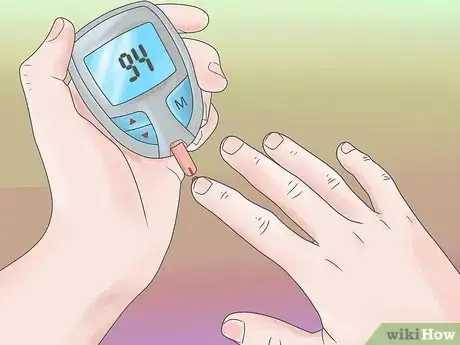
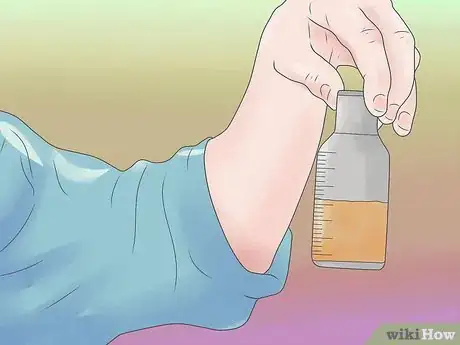
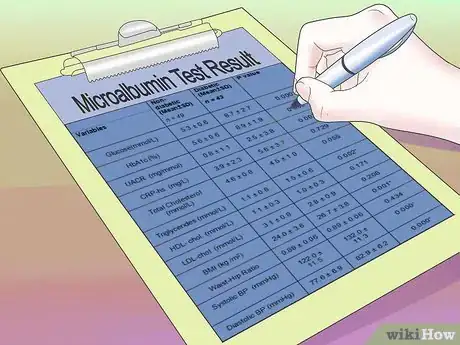
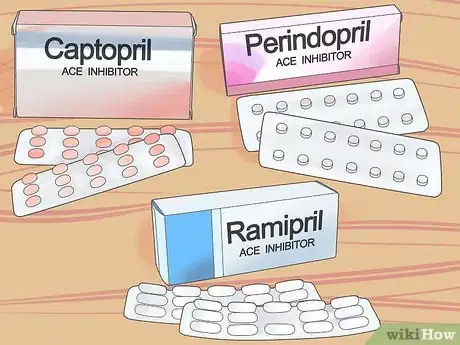


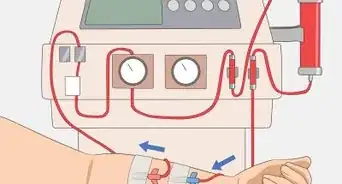



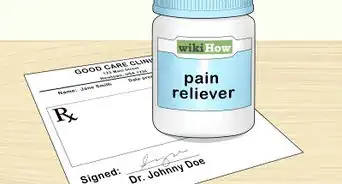



















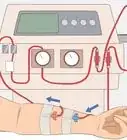
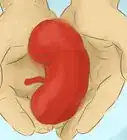





































Medical Disclaimer
The content of this article is not intended to be a substitute for professional medical advice, examination, diagnosis, or treatment. You should always contact your doctor or other qualified healthcare professional before starting, changing, or stopping any kind of health treatment.
Read More...